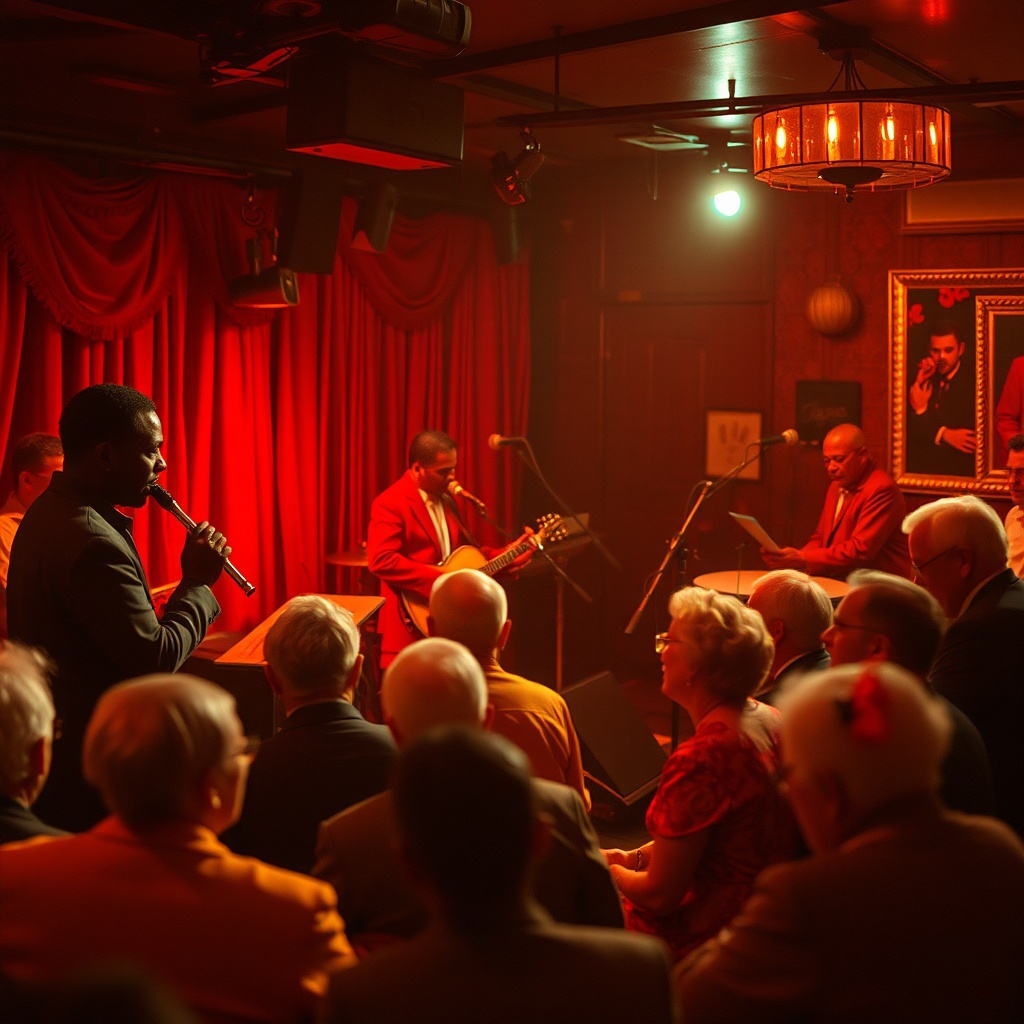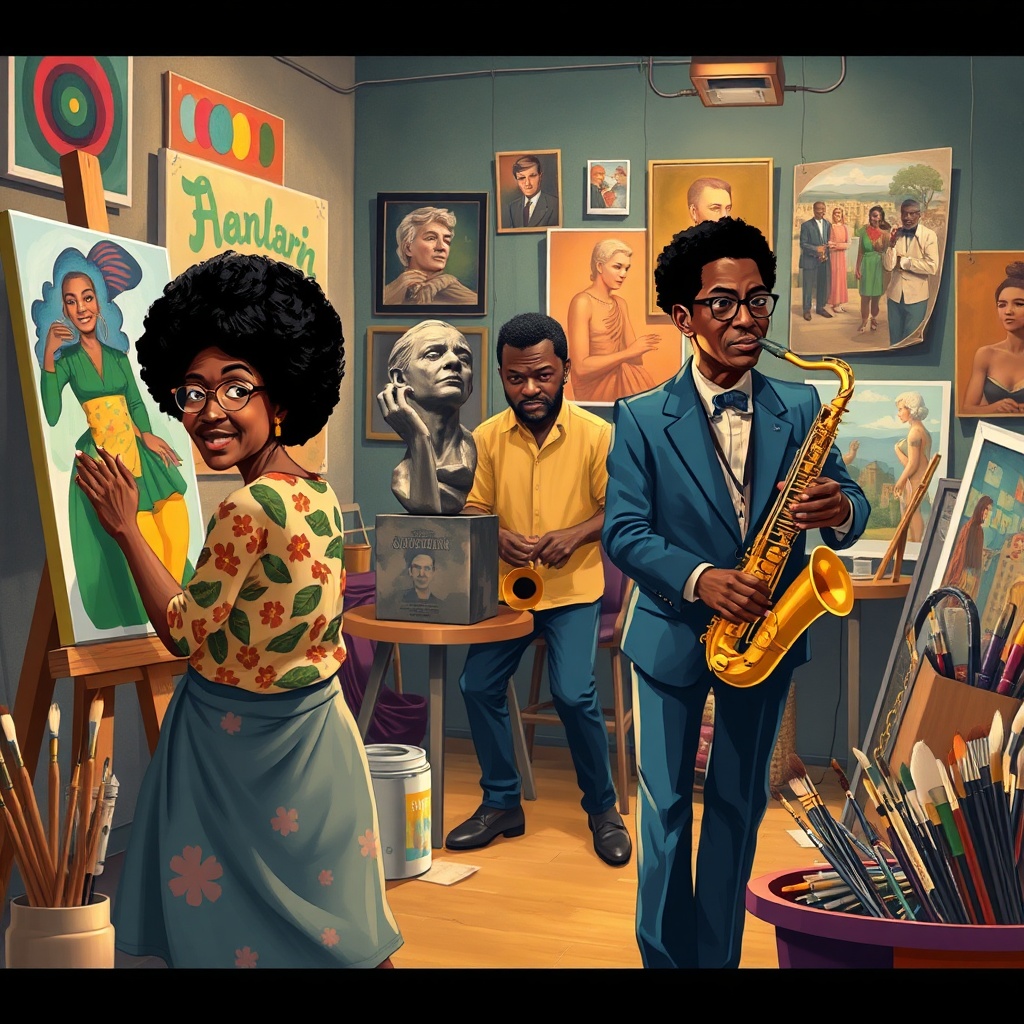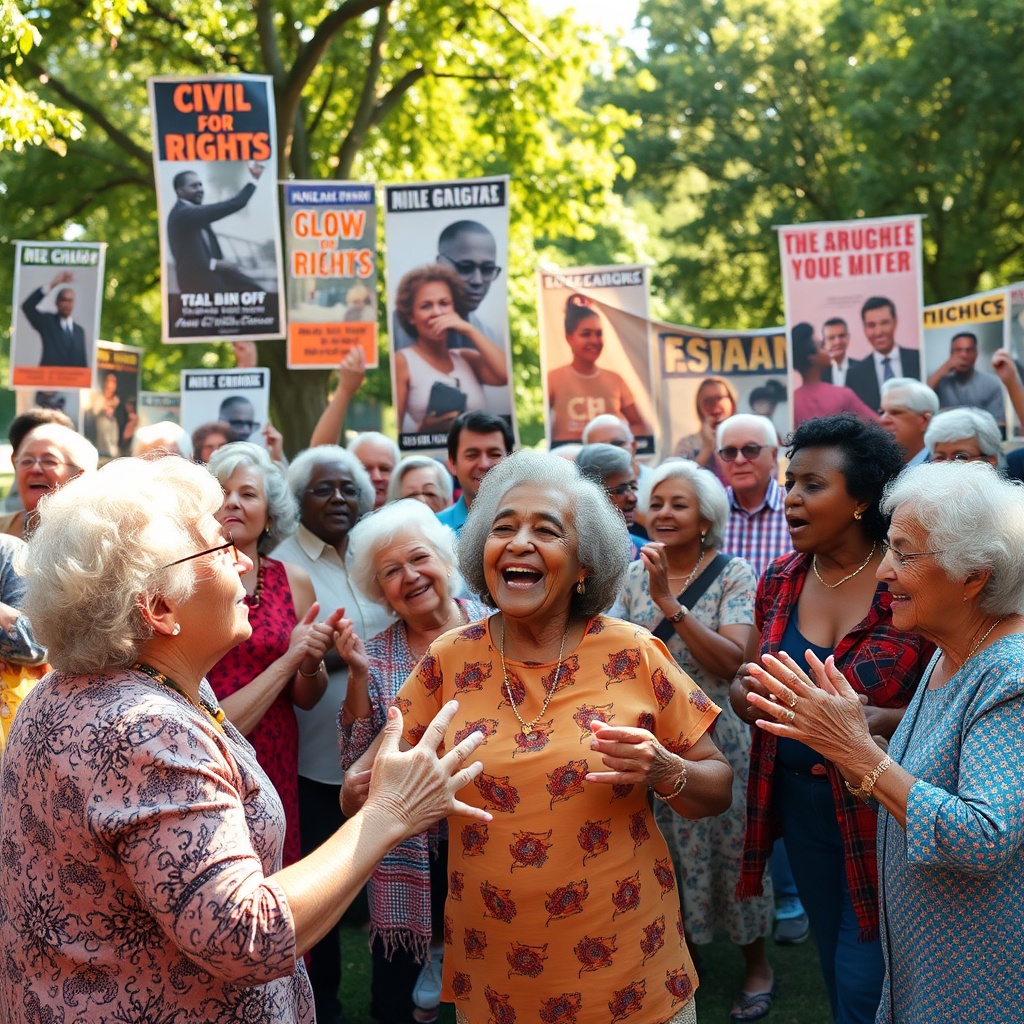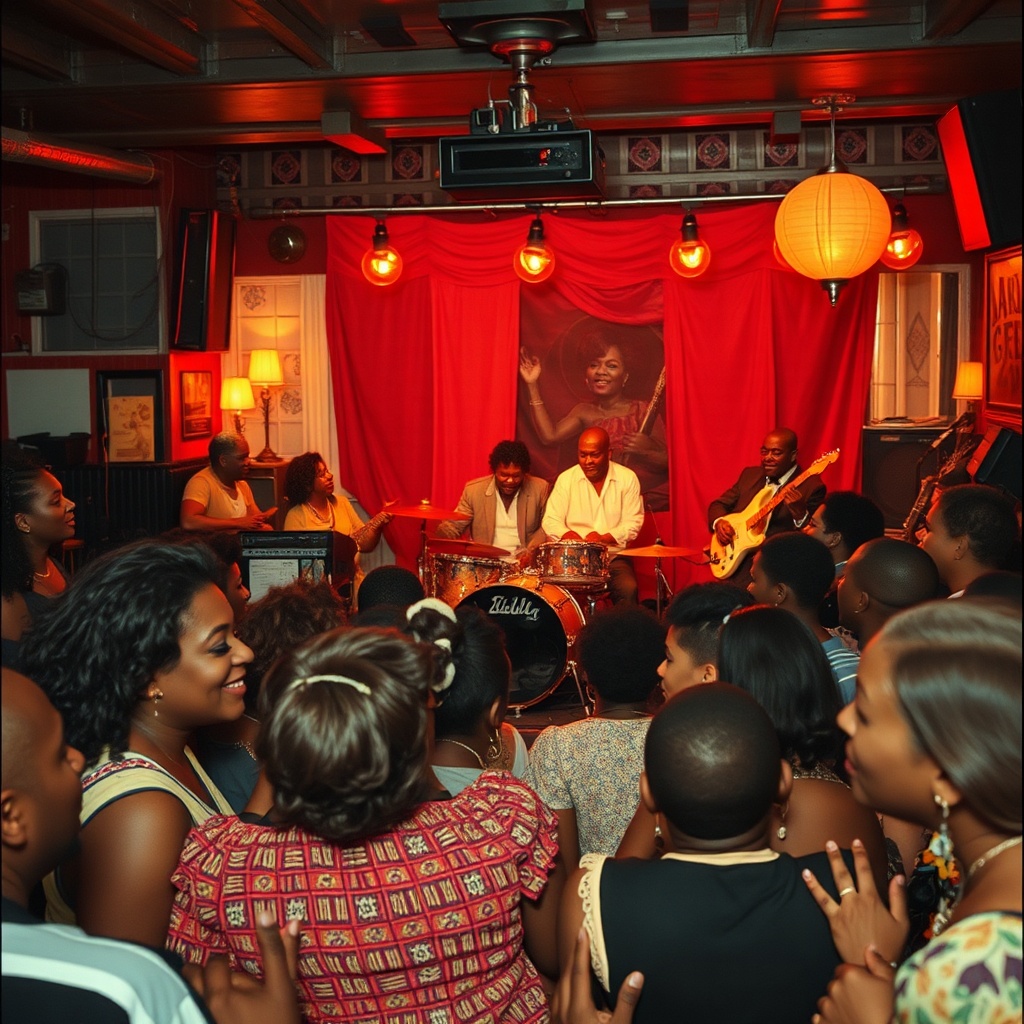Melodies of Change: How 1960s African American Music Reshaped a Nation

In the vibrant tapestry of American history, the 1960s stand out as a pivotal decade marked by profound social upheaval and transformation. African American musicians played a crucial role in this era, using their art to challenge injustice and inspire change. Their melodies became the anthems of a movement, resonating with the aspirations and struggles of a generation.
The Soundtrack of the Civil Rights Movement
Music was not just entertainment; it was a powerful tool for activism. As the Civil Rights Movement gained momentum, artists like Sam Cooke, Aretha Franklin, and James Brown emerged as voices of hope and resistance. Their songs conveyed messages of equality, freedom, and determination.
- Sam Cooke’s “A Change Is Gonna Come” became an anthem of the movement, encapsulating the struggles faced by African Americans.
- Aretha Franklin delivered powerful performances that celebrated Black identity and empowerment, particularly with her hit “Respect.”
- James Brown brought raw energy and pride to his music, with songs like “Say It Loud – I’m Black and I’m Proud.”
Musical Genres as Platforms for Change
The 1960s saw diverse musical genres emerging as platforms for social commentary:
- Jazz: Artists like John Coltrane and Miles Davis used their improvisational skills to express the complexities of the African American experience.
- Motown: The Motown sound, with its catchy melodies and polished production, brought attention to the struggles of Black Americans while appealing to a wide audience.
- Folk and Protest Songs: Musicians like Bob Dylan collaborated with African American artists to create songs that addressed social justice issues.
Impact on Society
The impact of 1960s African American music extended beyond the concert stage:
| Musician | Song | Impact |
|---|---|---|
| Sam Cooke | A Change Is Gonna Come | Inspired hope and resilience during the Civil Rights Movement. |
| Aretha Franklin | Respect | Empowered women and became a rallying cry for the feminist movement. |
| James Brown | Say It Loud – I’m Black and I’m Proud | Encouraged pride in Black identity and culture. |
Legacy of the 1960s Music
The legacy of these musicians continues to resonate today. Their messages of change and resilience remind us of the power of music as a catalyst for social change. As we reflect on this rich history, it is essential to remember:
- The struggles faced by African Americans have shaped the cultural landscape of the nation.
- Music has the ability to unite people across generations and inspire collective action.
- Today’s artists continue to draw inspiration from the pioneers of the 1960s, ensuring that their melodies of change echo on.
The 1960s were a transformative period for African American musicians who used their voices to reshape a nation. Their contributions not only influenced the music industry but also served as a critical foundation for ongoing struggles for justice and equality. Let us celebrate these resilient voices and honor their legacy by continuing to listen, learn, and advocate for change.
Voices of Valor: Celebrating the Courage of Black Artists in the 1960s

In the 1960s, a powerful wave of creativity emerged from the African American community, giving rise to a rich tapestry of music that not only entertained but also inspired and mobilized a generation. Join us as we explore the heartfelt narratives of these brave artists who dared to challenge the status quo.
Breaking Barriers
Black musicians of the 1960s were not just artists; they were voices of change. They used their platforms to speak out against injustice and inequality. Consider the following influential figures:
- James Brown – Often referred to as the ‘Godfather of Soul’, he famously declared, ‘I’m Black and I’m Proud’, empowering countless individuals to embrace their identity.
- Aretha Franklin – The ‘Queen of Soul’ infused her music with messages of strength, resilience, and love, becoming an icon of the Civil Rights Movement.
- Marvin Gaye – With his poignant lyrics in songs like ‘What’s Going On’, he questioned societal issues and urged for peace and understanding.
The Power of Music
Music served as a rallying cry during the tumultuous years of the Civil Rights Movement. Artists became instruments of change, using their voices to echo the struggles and aspirations of their communities. Reflect on how these melodies still resonate today:
- What songs do you remember that sparked a sense of pride?
- How did music influence your perspective on social issues during that time?
The Legacy Lives On
The courage displayed by these musicians paved the way for future generations. Their legacies are not only preserved in recordings but also in the ongoing fight for equality and justice. Let’s honor their contributions:
- By listening to their music and sharing it with younger generations.
- By supporting contemporary artists who continue the tradition of activism through art.
The 1960s were a defining era that showcased the valor of Black artists who bravely faced challenges through their art. Let us celebrate their indomitable spirit and ensure that their messages of freedom and courage continue to inspire.
Rhythms of Resistance: The Soundtrack of the Civil Rights Movement

Understanding the Power of Music in the Civil Rights Movement
The 1960s were a time of profound change and upheaval in America, and music played an essential role in the Civil Rights Movement. The rhythms and melodies of this era provided a powerful backdrop for the struggle for equality and justice.
Key Genres and Artists
Throughout this period, various genres of music emerged as powerful instruments of resistance:
- Gospel: Artists like Mahalia Jackson and Sam Cooke used gospel music to inspire and uplift the spirits of those fighting for civil rights.
- Blues: Musicians such as B.B. King and Muddy Waters expressed the pain and struggles of the African American experience through their powerful lyrics and soulful rhythms.
- Folk: The folk music revival saw artists like Bob Dylan and Joan Baez collaborating with African American musicians to amplify the message of the movement.
Iconic Songs of the Movement
Some songs became anthems for the Civil Rights Movement, resonating deeply with those involved:
- A Change is Gonna Come by Sam Cooke: A poignant ballad that captured the hope for a better future.
- We Shall Overcome: This traditional protest song became synonymous with the movement and was sung at marches and rallies.
- Freedom Songs: These were often adaptations of existing songs, modified with lyrics that reflected the struggles and aspirations of the movement.
Music as a Tool for Unity
Music not only served as a means of expression but also as a tool for bringing people together:
- Rallies and Marches: Songs sung during demonstrations unified participants and strengthened their resolve.
- Community Gatherings: Local musicians performed at gatherings, fostering a sense of solidarity and hope.
Legacy of the 1960s Musicians
The impact of these musicians continues to resonate today:
- Inspiration for Future Generations: Artists today draw from the legacy of 1960s musicians, using their platforms to advocate for social justice.
- Cultural Significance: The music of this era remains a vital part of American culture, reminding us of the ongoing struggle for equality.
Reflection and Engagement
As we reflect on the role of music in the Civil Rights Movement, consider the following:
- What songs do you remember from this era, and what do they mean to you?
- How can music continue to serve as a tool for change in today’s society?
Music will always echo the stories of those who fought for freedom, reminding us of the resilience and strength of the human spirit.
Legacies of Hope: The Impact of 1960s Music on Future Generations
Resonating Through Time
Imagine the powerful melodies and poignant lyrics of the 1960s African American musicians echoing through the streets, filling hearts with hope and determination. These artists didn’t just create music; they forged a cultural revolution that transcended their time. How do you think their songs continue to influence us today?
Defining Moments in Music
The 1960s was a transformative decade for music and civil rights. Artists like Sam Cooke, Marvin Gaye, and Aretha Franklin used their platforms to challenge societal norms and inspire change. Each note played was a declaration of freedom. Can you recall a song from that era that moved you?
Instilling Values of Resilience
These musicians imparted values that resonate with younger generations, teaching lessons of resilience, pride, and social justice through their powerful lyrics. For instance, Cooke’s ‘A Change Is Gonna Come’ became an anthem of hope, urging listeners to believe in the power of change. What values do you think these songs instilled in you or your loved ones?
Bridging Generations
As time marches on, the music of the 1960s continues to bridge generations. Today’s artists frequently sample or cover these timeless songs, ensuring that the messages of love, equality, and perseverance remain alive. Have you noticed how current music reflects the themes of the past?
Cultural Identity and Expression
The music of the 1960s also played a crucial role in shaping African American cultural identity. It fostered a sense of community and pride, encouraging individuals to express themselves authentically. How have you seen music shape cultural identities in your own community?
Inspiring Future Generations
Ultimately, the legacies of these musicians serve as a beacon of hope. They inspire future generations to speak out, uplift their communities, and pursue their dreams despite adversity. What message would you like to pass on to younger generations about the power of music?
A Lasting Impact
Reflecting on the impact of the 1960s music, it is clear that these resilient voices have left an indelible mark on society. Their songs remind us that, even in the face of challenges, hope and unity can prevail. How do you feel when you hear these classic tunes today?
Soundwaves of Solidarity: Uniting Communities Through Music in Turbulent Times
Music has always been a powerful tool for expression and connection. In the 1960s, amidst the struggles for civil rights and social justice, African American musicians became the voices of a generation. Their soundwaves resonated not just through the air, but deep within the hearts of communities seeking unity and strength.
The Role of Music in Social Movements
Can you recall a song that made you feel empowered? During the 1960s, songs like ‘A Change is Gonna Come’ by Sam Cooke and ‘We Shall Overcome’ became anthems of the Civil Rights Movement. These melodies carried messages of hope, resilience, and the promise of change.
Gathering Spaces: Where Music and Community Meet
In times of struggle, community gatherings became vital. Churches, parks, and community centers transformed into spaces where music brought people together. Imagine the sound of voices harmonizing, hands clapping, and feet tapping. How did these gatherings make you feel?
The Musicians: Echoes of Their Time
Artists like Aretha Franklin and James Brown didn’t just sing; they spoke out against injustice. Their music was a call to action. What messages do you remember from their songs? Each note and lyric was a reminder that change was necessary and possible.
Connecting Generations Through Music
Music transcends age. As you share stories with younger generations, what songs do you think still resonate today? The power of music lies in its ability to connect experiences, bridging gaps between ages and backgrounds.
Conclusion: The Lasting Impact of Soundwaves
Even decades later, the music of the 1960s continues to inspire. It reminds us of the struggles faced and the victories won. As we reflect on the past, let us not forget how music united us in turbulent times. What role does music play in your life today?
The Beat of Activism: How African American Musicians Amplified the Fight for Freedom
The Power of Music in the Civil Rights Movement
Music has always been a powerful medium for expression, especially for those fighting against oppression. In the 1960s, African American musicians used their talents to not just entertain, but to inspire change and unite communities. Can you recall a song that moved you deeply or made you feel a part of something greater? This era was marked by an incredible fusion of passion and purpose, as artists took to the stage to amplify their messages of freedom.
Voices that Resonate
Artists like Sam Cooke, James Brown, and Aretha Franklin became synonymous with the struggle for civil rights. Their songs became anthems of hope and resilience. For example:
- “A Change is Gonna Come” by Sam Cooke: A soulful ballad that reflected the struggles and hopes of African Americans.
- “Say It Loud – I’m Black and I’m Proud” by James Brown: This song celebrated Black identity and pride, encouraging individuals to embrace their heritage.
- “Respect” by Aretha Franklin: A powerful call for equality and respect, resonating with both men and women in the fight for justice.
What emotions do these songs evoke for you? They served not only as entertainment but as rallying cries for a movement that sought dignity and equality.
The Role of Music in Protests
During the marches and protests of the 1960s, music played a vital role in energizing the crowd and fostering a sense of unity. Songs were sung on the streets, in churches, and at rallies, creating a shared experience among participants. Have you ever participated in a protest or rally? Reflecting on those moments can enhance our understanding of music’s significance in activism.
Legacy of Activism through Music
The impact of 1960s African American musicians continues to resonate today. Their boldness and creativity laid the groundwork for future generations of artists. Do you have a favorite contemporary artist who carries this legacy forward? Artists like Beyoncé and Kendrick Lamar draw inspiration from their predecessors, using their platforms to address social issues and advocate for change.
Conclusion: The Ongoing Journey
While the 1960s were a pivotal time for civil rights, the journey toward equality continues. Music remains a vital tool in the fight for justice. How do you see music influencing today’s movements? As we reflect on the past, let us recognize the enduring power of music as a force for activism and change.
Songs of the Struggle: Uncovering the Hidden Histories of 1960s Black Musicians
Exploring the Soundtrack of Change
In the 1960s, a wave of creativity surged through the African American community, giving birth to songs that not only entertained but also inspired social change. These artists used their music as a tool for resistance, shedding light on the struggles and triumphs of their people. Can you remember the songs that resonated with you during that time?
Voices of Resistance
Musicians like Sam Cooke, Aretha Franklin, and James Brown used their platforms to address issues such as civil rights, inequality, and identity. Each note carried the weight of their experiences, echoing the sentiments of a generation fighting for freedom. Have you ever felt the power of music to evoke memories of those struggles?
The Hidden Histories
While some stories are well-known, many narratives remain hidden. Artists like Odetta and Billie Holiday paved paths in the music scene, often overlooked in mainstream history. Their songs told tales of pain, perseverance, and hope. What stories do you think have been lost in the shadows?
A Legacy of Empowerment
The music of the 1960s laid the groundwork for future generations, influencing genres from hip-hop to R&B. It offered empowerment, healing, and a sense of community. Which songs from that era continue to inspire you today?
Engaging with the Past
As we explore these powerful melodies, reflect on the impact they had on your life and the lives of those around you. What moments do you cherish that were marked by these songs? Sharing these stories can help preserve the legacy of these remarkable musicians.
Harmony and Heartbreak: The Dual Nature of 1960s African American Musical Expression
In the vibrant tapestry of the 1960s, African American musicians wielded their art as a powerful tool for both expression and resistance. Their music was a reflection of the societal turmoil, a blend of joy and sorrow, illustrating the duality of the human experience. Let us delve into the key themes that characterized this rich musical era.
Joy in the Struggle
Many African American artists found ways to celebrate their culture and resilience through music. The rhythms of gospel, blues, and soul provided a foundation for expressing hope amidst adversity. These genres often conveyed messages of unity and strength, encouraging listeners to persevere.
- Gospel Music: Uplifting hymns resonated with the spirit of the Civil Rights Movement, inspiring communities to come together.
- Soul Music: Artists like Aretha Franklin and James Brown infused their songs with a sense of empowerment, celebrating black identity.
Heartbreak in Reality
Despite the joyous melodies, the 1960s were also marked by profound heartbreak. The struggle for civil rights was fraught with challenges, and musicians often used their platforms to highlight the pain and injustice faced by African Americans.
- Blues Music: This genre captured the essence of sorrow, with artists like B.B. King and Muddy Waters expressing the deep emotional scars left by racism and inequality.
- Protest Songs: Artists such as Bob Dylan and Nina Simone penned powerful anthems that called attention to social injustices, reflecting the heartbreak of a nation divided.
The Impact of Musical Expression
The dual nature of musical expression in the 1960s served not only as a reflection of the time but also as a catalyst for change. By intertwining joy and sorrow, musicians crafted a narrative that resonated deeply with their audience.
Interactive Reflection
As you reflect on the music of this era, consider the following:
- What song from the 1960s resonates with your personal experiences of joy or heartbreak?
- How do you think the themes of struggle and resilience are relevant today?
The music of the 1960s remains a testament to the resilience of African American artists. Through harmony and heartbreak, they created a legacy that continues to inspire and empower future generations.
Echoes of Empowerment: Inspirational Stories Behind Iconic 1960s Songs
The Soundtrack of Change
The 1960s was a decade that echoed with the cries for freedom and equality. African American musicians not only shaped the music of the time but also became the voice of a movement. Each song tells a story, a narrative woven with threads of struggle, hope, and resilience.
Exploring Iconic Songs
Let’s delve into some of the most iconic songs from this era and uncover the inspirational stories behind them.
| Song Title | Artist | Year | Story Behind the Song |
|---|---|---|---|
| “A Change Is Gonna Come” | Sam Cooke | 1964 | This powerful anthem was inspired by Cooke’s experiences with racism and the civil rights movement. Written in response to Bob Dylan’s “Blowin’ in the Wind,” it captures the longing for change and the hope for a better future. |
| “Respect” | Aretha Franklin | 1967 | Originally written by Otis Redding, Franklin’s version transformed the song into a feminist and civil rights anthem. Her powerful delivery demanded respect not just for herself, but for all women and African Americans. |
| “Say It Loud – I’m Black and I’m Proud” | James Brown | 1968 | This declaration of pride in being Black resonated deeply during the civil rights movement. Brown’s song became a rallying cry for African Americans embracing their identity amidst oppression. |
| “For What It’s Worth” | Buffalo Springfield | 1966 | This song reflects the unrest of the times, particularly the protests against the Vietnam War. Its message of awareness and activism continues to inspire generations. |
The Legacy of Empowerment
These songs, and many others, served as more than just entertainment; they became the anthems of a generation seeking empowerment. Each note, lyric, and performance was infused with the struggle for justice and equality.
Reflecting on the Past
As we listen to these iconic songs, let us take a moment to reflect on the stories they tell. What feelings do they evoke? How do they resonate with the struggles faced today? Music has the power to connect us to our history and inspire future generations.
Crescendo of Change: The Evolution of African American Music in the Face of Adversity
The Roots of Resilience
In the vibrant tapestry of American history, African American music has served as both a reflection and a reaction to the challenges faced by the community. The rhythms of jazz, the soul of gospel, and the beats of blues all tell stories of struggle and triumph. Can you recall a time when music provided solace during difficult moments?
Echoes of the Past
As we journey through the 1960s, we find ourselves at a pivotal intersection where music became a powerful tool for social change. Artists like Sam Cooke and Aretha Franklin used their voices to challenge the status quo. Their songs resonated with the cries for justice and equality. What songs do you remember that inspired you during that time?
Voices of the Movement
Music was not just entertainment; it was a vehicle for activism. The Civil Rights Movement found its anthem in songs like A Change is Gonna Come and Respect. These powerful lyrics galvanized a generation. How did these songs make you feel? Did they inspire you to take action or reflect on your own experiences?
- Jazz – A genre that evolved from the struggles of African Americans, jazz became a form of expression that transcended barriers.
- Gospel – Rooted in spirituals and hymns, gospel music provided hope and strength, lifting spirits in times of despair.
- Blues – A genre born from hardship, blues told stories of heartache and resilience, connecting generations through shared experiences.
Legacy and Influence
The music of the 1960s laid the groundwork for future generations. Artists like James Brown and Marvin Gaye carried the torch forward, infusing their work with messages of hope and empowerment. What artists from subsequent decades have carried forward this legacy for you?
As we reflect on the evolution of African American music, consider the impact it has had on your life. Take a moment to think about the songs that resonate with you. How do they speak to your experiences? What memories do they evoke? Share your thoughts with friends or family; music has a unique way of connecting us all.
